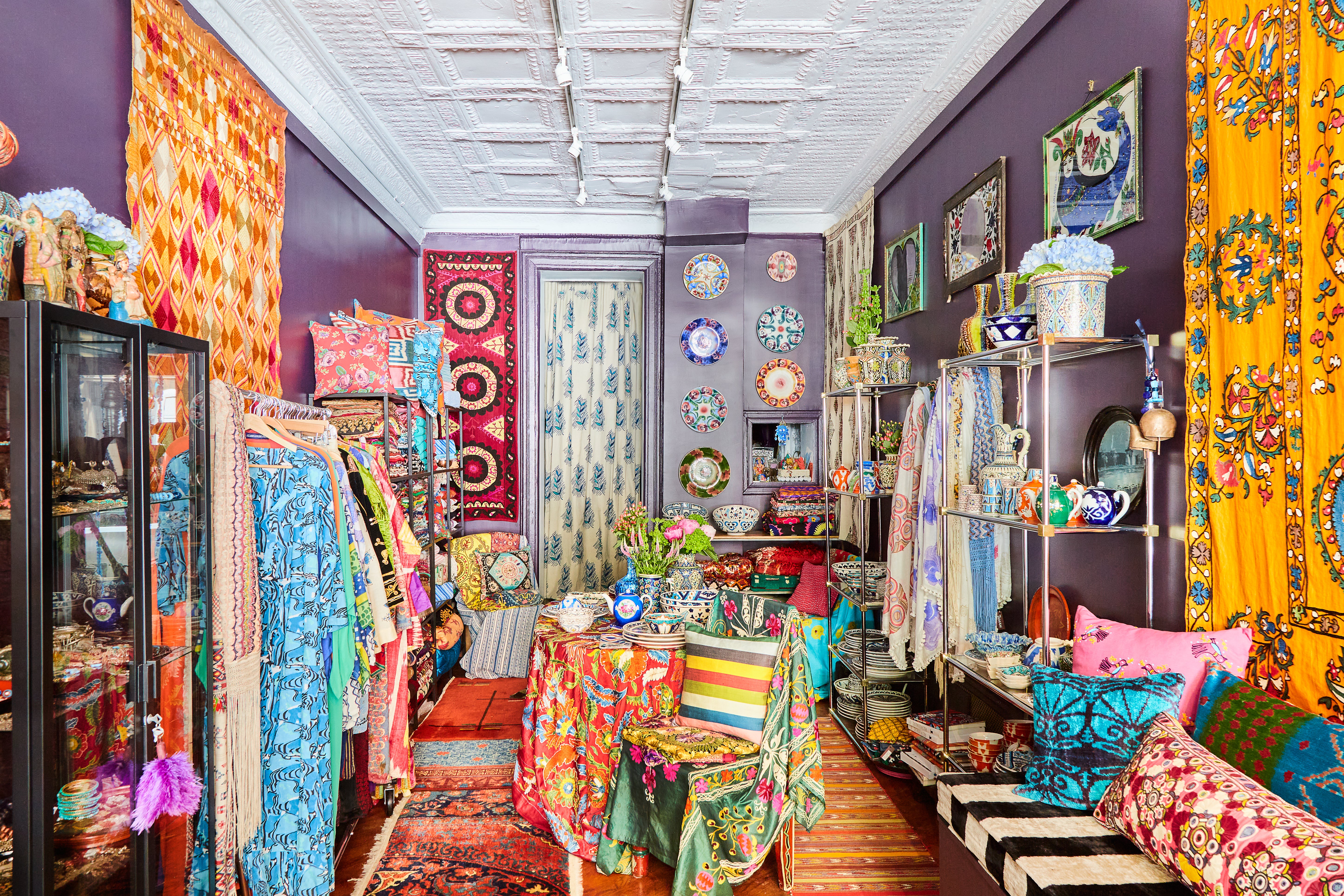In Business of Home’s series Shop Talk, we chat with owners of home furnishings stores across the country to hear about their hard-won lessons and challenges, big and small—to find out what they see for the future of small industry businesses like theirs.
This week, we spoke with Clare Louise Frost, a designer, actor, home goods dealer and part-owner of the Tamam store in New York’s East Village. Since the space opened in 2018, Frost has operated it in partnership with designer Elizabeth Hewitt and Hüseyin Kaplan, a textile and carpet dealer, both of whom reside in Turkey. Tamam sells Hewitt’s textile line Tulu and Frost’s own eponymous designs, as well as vintage and handmade pieces sourced in Turkey, India and Central Asia. Frost chatted about finding her team, taking customers on international tours and living inside Excel spreadsheets.
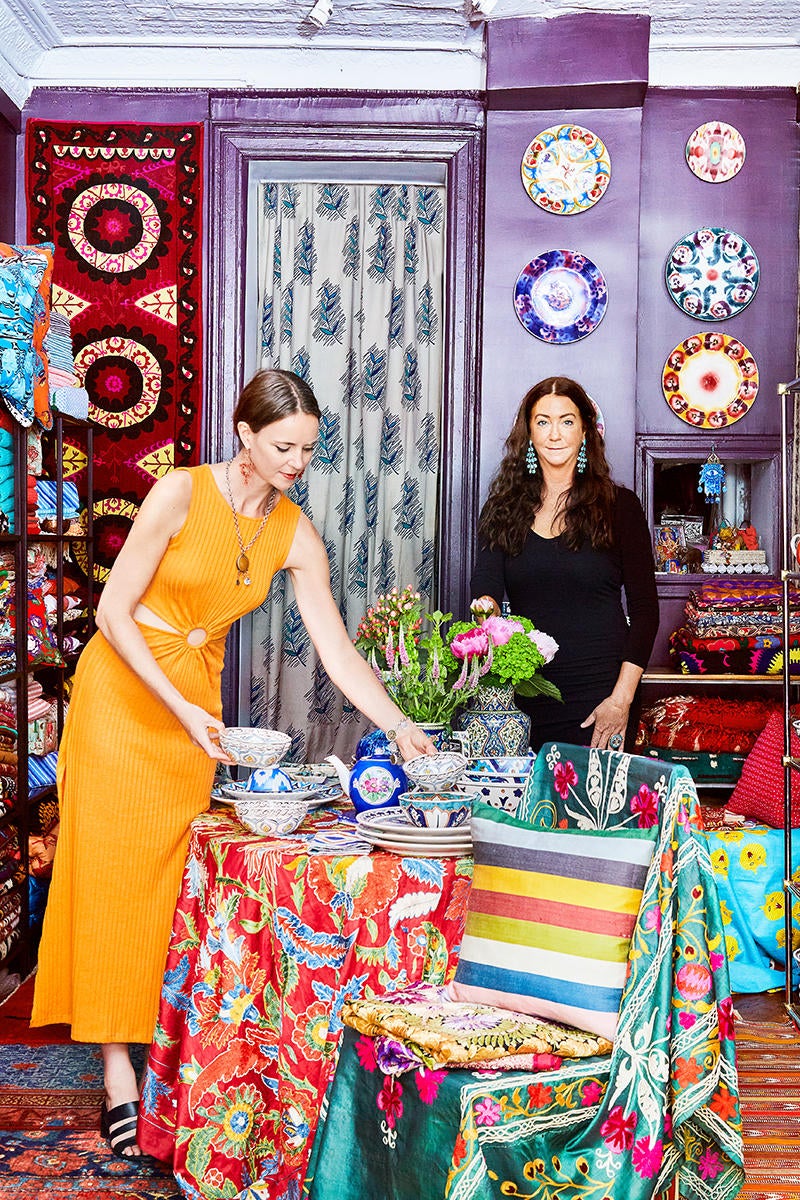
What was your background before the shop?
I worked for Elizabeth in Istanbul for years, for her Tulu line, which I still do. She’s the designer-owner; I’m the gal Friday. My background is in antique textiles, specifically Anatolian kilim. I originally went to Istanbul to work as the assistant for an antique textiles collector, Josephine Powell. Those early days in Istanbul, I was surrounded by mostly kilims.
What drew you to Turkish textiles in the first place?
I’ve always been interested in traditional clothing, handsewn clothing, be it eastern, western, northern or southern, because older cuts tend to use fabric intelligently—in terms of not wasting anything but also in terms of drape, fit, style, adaptability. I’ve always collected vintage clothing and shoes. After college, I was living in Tuscany, working on a vineyard, and the winemaker there had a friend in Istanbul who needed an assistant. I had been to Turkey before and loved it. So I jumped at the opportunity.
Amazing! When did you first become connected with Elizabeth?
I actually met Hüseyin, who’s the third partner of Tamam, first. I was traveling through Anatolia in a van with some rug dealers, then we went to Konya, in central Turkey, which is where Hüseyin and his brother are from. They are the dealers’ dealers. They have more rugs than anybody else on the planet. When I met Hüseyin, he was like, “You probably know my girlfriend, Elizabeth. She’s American and she’s into textiles and she lives in Istanbul. You’d probably get along.” Fast-forward I don’t remember how much longer, I was in the bazaar visiting a dealer friend and Elizabeth happened to be there as well. She was talking about how she was opening a store and needed someone to work there, and I was like, “Oh, you’re that guy’s girlfriend! I need a job.” I started working for her at Tulu, then went with her on production trips to India and Pakistan. She really put the pieces together. As a designer, I always loved the old stuff, but she was using old techniques to make new things—in business and as a way of life. She taught me how to do that.
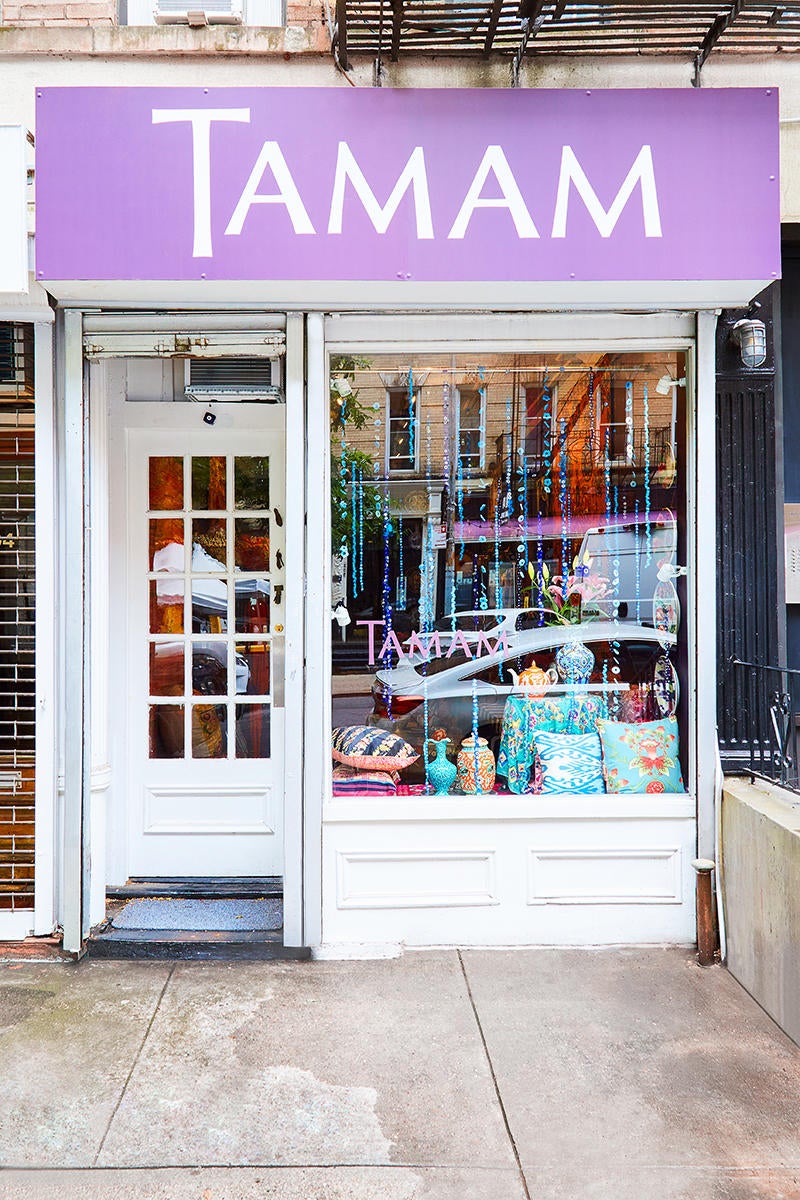
When and how did the New York store come about?
Totally by kismet. Opening a retail store seems like the stupidest idea ever. None of us has money to burn. But Elizabeth and I happened to be in New York at the same time, in a vintage clothing store on East 6th Street, talking to the guy who runs it. He said he had a great landlady and his rent was really reasonable, and another space [of hers was] available in another building a block away. We walked over, contacted the number for the property manager, and when he told us the rent it was like, “Are you kidding me? This is New York City, why is the rent so low?” Elizabeth and I looked at each other like, “I think we have to open a store.” We decided to open it as the three of us, so we split everything—it’s got Hüseyin’s antique rugs and all of our old textiles, and then the Tamam design line that Elizabeth and I work on together, as well as my line and Elizabeth’s line too. It’s this beautiful partnership of all the things that all of us do.
Did you move from Turkey back to the U.S. to open the store?
The year that we found the store, I was actually living back in Italy and had all my stuff in storage in New York. I was between things, hoping, “Maybe something will come up somewhere.” The store came up, and it was a great reason to anchor in New York. I’m also an actor and filmmaker, so it gave me a good opportunity to continue that work here.
So what products do you carry in the store?
Tamam is a big umbrella of a store. We have vintage and antique Turkish, Anatolian, Kurdish and Caucasian rugs. We have Central Asian, Turkish and Northwest Indian vintage and antique textiles. We have decorative pillows, including our handwoven ikat pillows, pillows from Tulu, pillows from Clare Louise Frost. We have clothing, both my line and some of Elizabeth’s designs, which are all hand-made, hand-block-printed, hand-stitched. And then antique clothing, beautiful Ottoman robes. Really, it’s an old-fashioned boutique. We have jewelry. Gorgeous, mine-cut Ottoman diamonds. And we have Tulu bedding, Turkish towels. Tabletop is either antique Ottoman ceramics or our own lines. Anything new in the store is either my design, Elizabeth’s design or our design together.
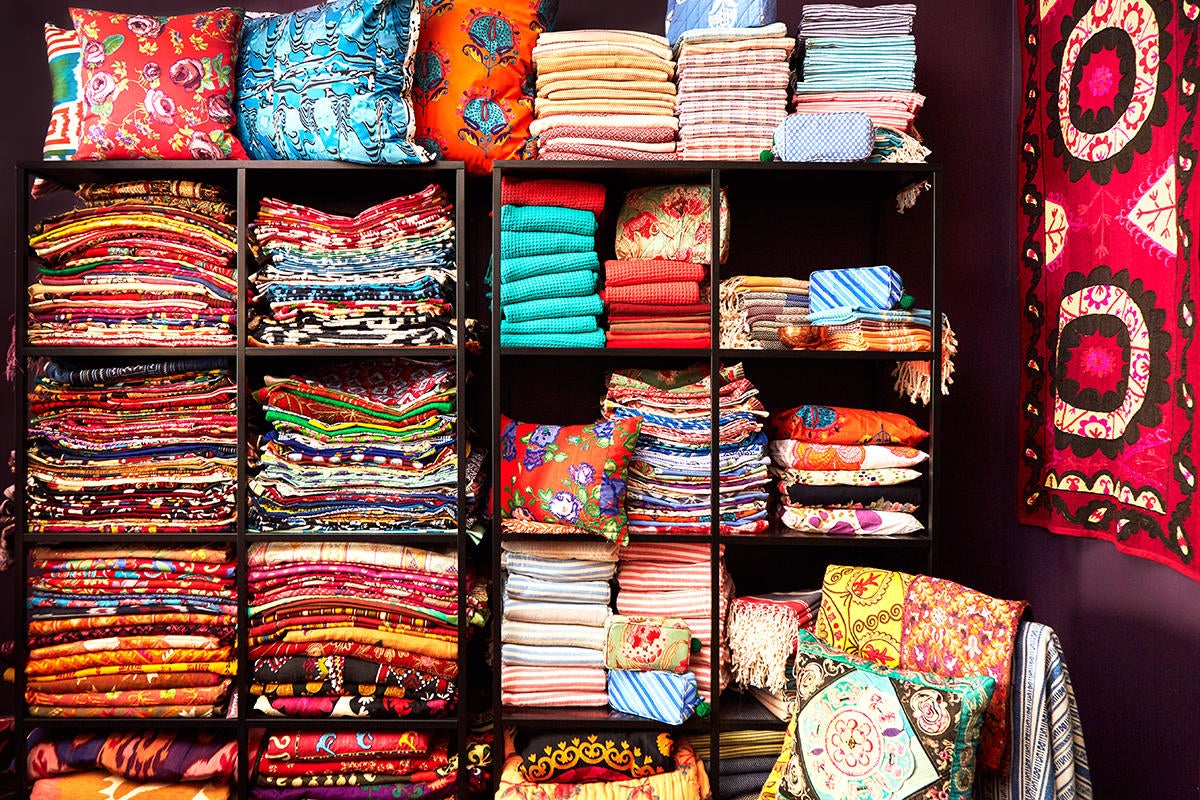
What’s the general vibe? To describe it as a bazaar seems cliché, but it feels appropriate here.
It’s small, very colorful, and we pack it in. There’s a coffee table, a central table and shelves on the side, all with displays. We have stacks of textiles. And if you start digging, you will be rewarded. So in that sense, it is like a bazaar, a treasure hunt. Once you start looking, you realize how much there is to find.
Who is your typical customer? The trade, or people wandering in off the street?
We do a lot of business with the trade. With rugs, designers email us looking for a particular kind of textile or a particular kind of rug, “these colors, these dimensions,” and we’ll send them as many photos as they can stand of our collection. What we have in the store is just the tip of the iceberg of what we have as dealers. The retail store is one thing, the vast collection behind it is another.
Retail-wise, we have a great collection of neighborhood clients who come in when they’re going to a wedding or need a birthday present or housewarming gift. They know they can find something nice, and it’s unique, it’s thoughtful, it’s handmade. People come to us because—I hear this again and again and again—“There are no more stores like this,” that have unique things, a curated eye, [with] a storekeeper choosing each item for a reason.
Is there a certain type of item that you can’t keep in stock, that’s always flying out the door?
Our napkins have been really hot. We just started them a few months ago, before the holiday season. People come in and buy sets of eight of one kind, or they’ll buy one of each to mix and not match. I love watching how people curate their own tabletop. Our serving bowls are always popular too.
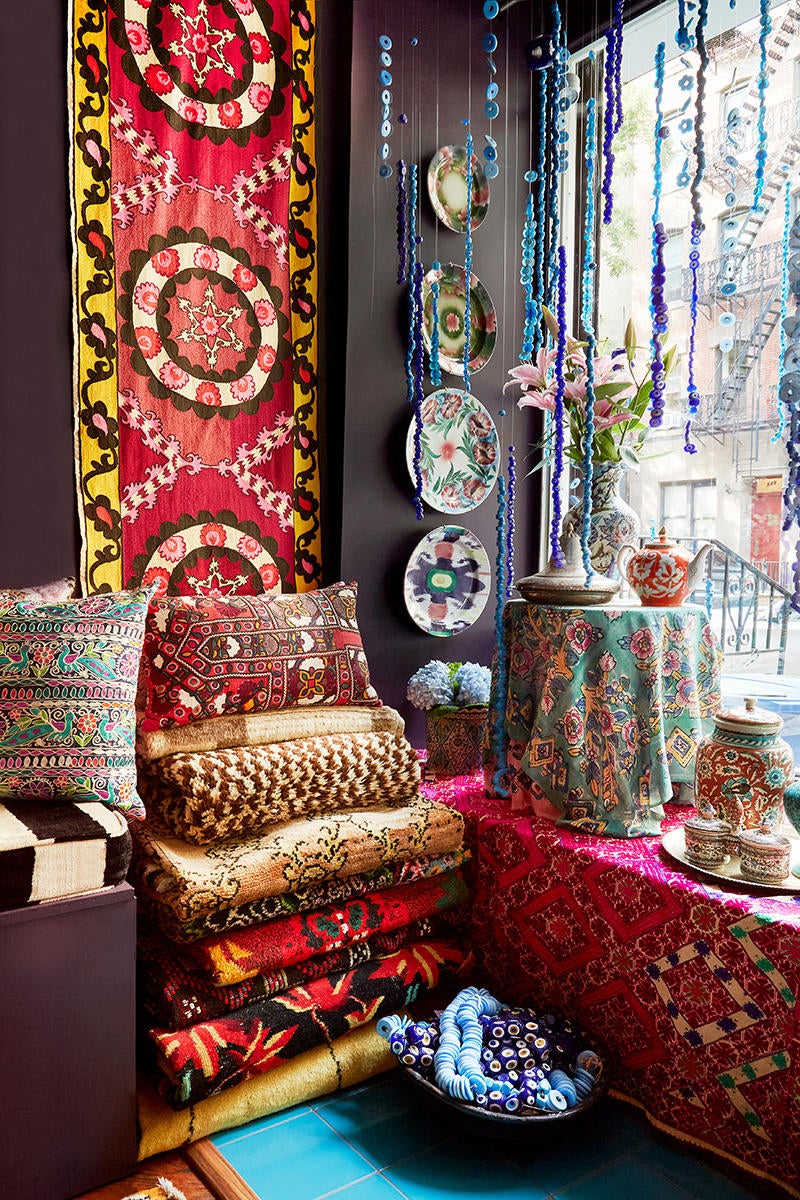
What’s your favorite item in the store right now?
I love our Izzet lunch plate. We only do it in the small format, and it’s so cute. Izzet is a man’s name, so I have such a crush on him. We do the same pattern, an interlocking lattice from an Ottoman tile design, in a block print on napkins and fabric, which I love as well.
If you could go back to opening day, is there any advice you wish you could give yourself?
We made a rule at the beginning, and we’ve never wanted to break it: We only have things we love. Even if there’s something that we know is popular or people think is cool, if we’re not into it or think it’s kind of cheesy, then we’re not going to sell it. So in that sense, it’s really easy. All the things in Tamam are there for a reason.
What is your biggest everyday challenge?
I mean, the back end of running a business is always just … You’re in Excel sheets and handling emails all the time, with invoices and quotes, and making sure you didn’t forget something. I’d say 99.9 percent of my mental panic is based on that. When I’m at the store, in a way I feel like I get no work done, because there’s a whole load of other things to do—from dusting to folding to shipping to dealing with clients, that’s your whole day. Then you’re like, “Oh, right, I’ve got to pay sales tax!” It’s very unglamorous.
Do you have any big-picture concerns or things that keep you up at night?
Lots of things keep me up. Tamam is such a joy, because it’s helping us do more of what we love and show what we love to more people. It’s so exciting to have the Tamam line of ceramics, pillows, fabrics, and Elizabeth and I are going to continue to add to them. We’re excited to build that Tamam brand, and that includes—whatever, I hate this word—the Tamam “lifestyle.” That’s what we want to channel our energy into, so when people hear the name, they say, “Yeah, I know Tamam. It’s that funky place with the old stuff and the new stuff, and they do the Turkish thing.” Because we do have a foot in both worlds: We [launched] Tamam tours, which got delayed because of COVID-19. We finally did our first trip this past October, and we’re going to do them every year in May and October.
Tell me more about the tours.
They’re so fun. We bring everybody to our favorite dealers. Good food, great textiles, great culture, museums. You don’t have to be a designer to come. We have a real mix. We had a woman who professionally was a lawyer, but she’s into Turkish soap operas—she found us through my acting work in them. Another lady was a chef. The diversity of perspective is important too. A non-designer with a designer buying a rug is a really cute combination.
What’s something you wish more customers understood about the business?We do some amount of teaching. People go into a store, and they expect to find a retail associate getting paid an hourly wage who doesn’t know anything. When they find out I’m the owner, they’re like, “What? Why is an owner in the store?” The fun part is when you get to show people what you love. For example, Kütahya ceramics—Kütahya was the second Ottoman ceramics center. Lots of people know Iznik; Kütahya are a little bit less old but still collectible, and we love showing those. Many people who come into the store have never been to Turkey, so they don’t know. They’re also so disengaged from the idea of handmade—they’ve never seen someone make something with their hands. That’s an education as well.
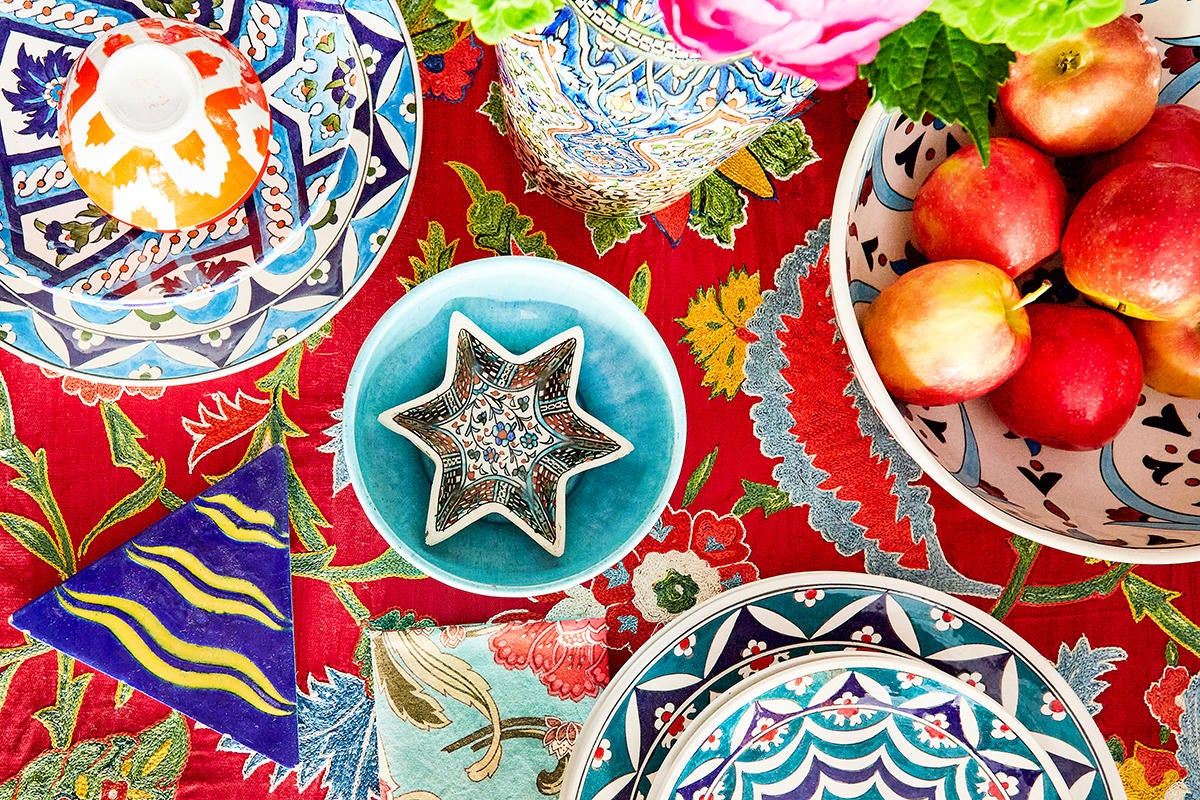
What’s a difficulty related to operating in New York specifically?
New York is divided by neighborhood. We’re in the East Village. For us, it’s perfect, with people from all different places doing all different things. But for a lot of people, it’s kind of gritty, and they have no reason to come downtown. But when was the last time I was on the Upper East Side? It’s like a different country, almost as if we need to find stores up there to wholesale to. New Yorkers will think, “Oh, weird, funky, colorful eclectic store in the East Village? I hope they don’t have sandalwood incense burning!”
I can definitely see that. What is the future of small businesses like yours? And has the pandemic changed that future at all?
When we opened, none of us had ever had a store in New York. We thought, even if not one person walks in the door, it will be worth the investment as advertising, for publicity. But having a brick-and-mortar has really been a game changer and has benefited all of our other businesses. People know where they can access Tulu bedding or pillows. We get phone calls from designers all the time looking for Tulu fabric. I sell more of my stuff now than I ever did as just me. If my pillows are on display, people are like, “Cool pillow, I’ll buy that.”
Our business grew during the pandemic. We had a lot more online sales and that coincided very luckily with getting press. People were at home reading magazines, and when they saw a bowl or a teapot or a pillow from Tamam, they hopped online. We got a lot of new customers who were not New York– or Northeast-based. We now have customers from Tennessee or California, [where] we didn’t have the reach before.
I mentioned that we have a very reasonable rent. We’re on a street, not an avenue; if you go to the avenue, you add a zero to our rent, and that’s insane. I cannot see how any retail store that’s not part of a big corporation can clear that in sales, and I think that’s a total tragedy. And why would anyone want to open a small business? I’m glad we had this lucky opportunity, but our rent and our space are quite rare.
What’s a great day as a shop owner?
It’s so fun when someone falls in love with something. It’s such a joy. They come in looking for a gift for someone else, and they find a suzani and they’re like, “Oh, my God, I love that suzani. I have no idea where I’m going to put it, but it’s just so beautiful.” They look at the stitching, they look at the colors. Someone thought about how to make it, someone chose those colors, and when that suzani finds a home with a totally different person in a totally different place, that’s magic. It’s like friends finding each other. That love, when you see it—it’s real.
Homepage image: Inside Tamam, a home goods store in the East Village | Belle Morizio
















